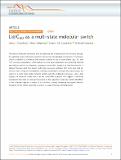Li@C60 as a multi-state molecular switch
Abstract
The field of molecular electronics aims at advancing the miniaturization of electronic devices, by exploiting single molecules to perform the function of individual components. A molecular switch is defined as a molecule that displays stability in two or more states (e.g. “on” and “off” involving conductance, conformation etc.) and upon application of a controlled external perturbation, electric or otherwise, undergoes a reversible change such that the molecule is altered. Previous work has shown multi-state molecular switches with up to four and six distinct states. Using low temperature scanning tunnelling microscopy and spectroscopy, we report on a multi-state single molecule switch using the endohedral fullerene Li@C60 that displays 14 molecular states which can be statistically accessed. We suggest a switching mechanism that relies on resonant tunnelling via the superatom molecular orbitals (SAMOs) of the fullerene cage as a means of Li activation, thereby bypassing the typical vibronic excitation of the carbon cage that is known to cause molecular decomposition.
Citation
Chandler , H J , Stefanou , M , Campbell , E E B & Schaub , R 2019 , ' Li@C 60 as a multi-state molecular switch ' , Nature Communications , vol. 10 , 2283 . https://doi.org/10.1038/s41467-019-10300-2
Publication
Nature Communications
Status
Peer reviewed
ISSN
2041-1723Type
Journal article
Description
R.S. acknowledges financial support from the Scottish Funding Council through SRD-Grant (HR07003). E.E.B.C. gratefully acknowledges Idea International Inc., Sendai, for providing samples of [Li@C60]+(PF6)–. H.J.C. and M.S. acknowledge financial support of EPSRC DTG studentships (EP/M508214/1 and EP/N509644/1, respectively).Collections
Items in the St Andrews Research Repository are protected by copyright, with all rights reserved, unless otherwise indicated.

